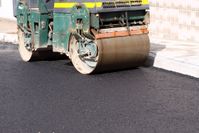
Like many aspects of transportation, the world of asphalt paving has experienced significant advancements since its inception. Today, roadways are safer to travel on, easier to maintain, and more resistant to heavy traffic and weather conditions. The pavement of yesteryear is a far cry from the roads we use today.
Here are a few fascinating facts about the history of asphalt:
- 7th Century BC: The very first paved roads originated in Babylon. The Greeks coined the term “asphaltos,” which translates literally to the word “secure.” They commonly used the material as a sealing agent for baths and reservoirs.
- Late 16th Century: It was during this time the Europeans stumbled upon significant reserves of naturally occurring asphalt on Trinidad. It was still primarily used to seal surfaces, however, and was incorporated on many ships to prevent leaks.
- Early 18th Century: In 1717, John Metcalf, who built 180 miles of roadways in England, sought road material with good drainage and thus decided to try layers consisting of large stones, excavated road materials, and a layer of gravel. Afterward, John Loudon McAdam incorporated hot tar in the process.
- 1870: This is the year in which the United States saw its first asphalt road, built by Belgian chemist Edmund J. DeSmedt in Newark, NJ. DeSmedt also completed the asphalt paving along Pennsylvania Avenue in Washington, DC.
- Early 20th Century: As the automobile became the main form of transportation in the early 1900s, the need for asphalt paving increased significantly. To meet these rising demands, developers sought solutions for producing asphalt at a quicker rate, which led to the creation of many asphalt plants.

- WWII: Asphalt technology improved substantially during this era, in part due to the need for roads able to support military aircraft. By the end of the war, Congress allotted $51 billion for new roadway construction. Larger, more efficient machines were developed as a result.
- 1960s to Now: Within the past 50 years, the U.S. has sought ways to improve the economic impact made by asphalt production. Plants have become much cleaner, and according to the National Asphalt Pavement Association, asphalt is now the most recycled material in the country. It also covers more than 94% of the roads in our nation.
Grey-Ruso Construction in Queens, NY, is proud to say they’ve been a part of the asphalt paving revolution for the last 35 years. With state-of-the-art technology and a detail-oriented team, their company is New York’s leader in paving and can accommodate clients with projects of all sizes. To request a free estimate for your paving needs, call (718) 358-1836, or visit them on Facebook to learn more.
About the Business
Have a question? Ask the experts!
Send your question

